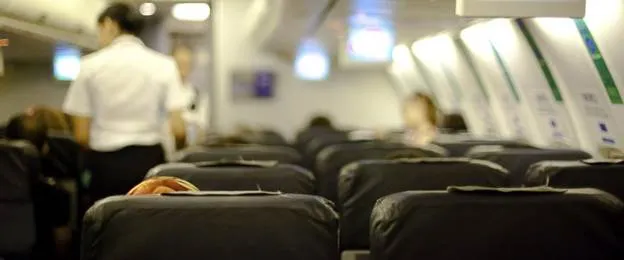
Cabin crew deal with an ancient evil
May 29, 2018

A routine flight takes a terrifying turn when cabin crew members discover that an ancient evil has stowed away on their aircraft. As passengers begin to exhibit strange behaviors, the team must unravel the mystery behind the malevolent presence. With limited time and resources, they delve into the plane's hidden compartments, unearthing relics that awaken the dark force. As chaos unfolds in the cabin, the crew must rely on their training and instincts to confront the supernatural threat. In a race against time, they seek to protect the unsuspecting passengers and banish the ancient evil before it claims them all.
As the sun sets over the horizon, a seemingly ordinary flight takes a sinister turn. Cabin crew, trained to handle emergencies, suddenly find themselves facing an ancient evil that has awakened from its slumber. This surreal scenario might seem like the plot of a horror movie, but it showcases the extraordinary challenges that cabin crew can encounter. Their training, teamwork, and resilience become crucial as they navigate through this unexpected turbulence.
The Role of Cabin Crew in Crisis Situations
Cabin crew are the frontline heroes of the airline industry. They are responsible for the safety and comfort of passengers, but their roles extend far beyond serving snacks and drinks. In a crisis, cabin crew must quickly assess situations, communicate effectively, and implement safety protocols. Whether it’s a medical emergency or an unexpected threat, the crew's ability to remain calm and collected is vital.
| Key Responsibilities of Cabin Crew | Importance |
|---|---|
| Passenger Safety | Ensuring the well-being of everyone on board. |
| Emergency Protocols | Implementing safety measures during crises. |
| Communication | Keeping passengers informed and calm. |
| Teamwork | Coordinating efforts with fellow crew members. |
Encountering the Unknown: A Tale of Terror
Imagine a flight that is just a few hours in when inexplicable events begin to unfold. The cabin crew starts noticing strange occurrences: flickering lights, odd noises, and a chilling atmosphere. As the tension builds, they realize that they are not alone. An ancient evil, dormant for centuries, has been awakened, seeking to wreak havoc on the unsuspecting passengers.
In such a scenario, the cabin crew must draw upon their training and instincts to confront the fear that grips everyone on board. They must harness their knowledge of emergency procedures while also addressing the psychological aspects of fear and anxiety among passengers. This requires not only technical skills but also emotional intelligence and leadership.
Strategies for Confronting the Ancient Evil
Dealing with an ancient evil can be likened to managing a high-stakes crisis. Here are some strategies that cabin crew might employ:
- Stay Calm and Collected: Panic can spread quickly. The crew must maintain their composure to instill confidence in passengers.
- Assess the Situation: Identifying the nature of the threat is crucial. Is it psychological, supernatural, or a result of mass hysteria?
- Communicate Clearly: Keeping passengers informed can mitigate fear. Clear announcements about what is happening can provide a sense of control.
- Implement Safety Protocols: Depending on the nature of the evil, the crew may need to enact specific safety measures, such as securing the cabin or preparing for an emergency landing.
- Work as a Team: The importance of collaboration can't be overstated. Crew members must support each other to effectively manage the crisis.
The Importance of Training and Preparedness
The ability of cabin crew to face an ancient evil highlights the significance of their training. Regular drills and simulations prepare them for a variety of scenarios, ensuring they can respond effectively under pressure. This preparation extends beyond physical safety to include psychological readiness, enabling them to handle fear and uncertainty.
Incorporating elements of the unexpected into training can enhance the crew’s ability to think on their feet. By simulating unusual situations, such as supernatural phenomena or psychological threats, airlines can ensure their cabin crew is ready for anything. This kind of comprehensive training contributes to a culture of safety and preparedness.
Conclusion: The Unsung Heroes of the Skies
Cabin crew are often the unsung heroes of the aviation world. Their ability to handle crises, whether mundane or extraordinary, is a testament to their skills and training. As they grapple with the unknown, they embody the spirit of resilience and teamwork. An ancient evil may be a metaphorical representation of the challenges they face, but it underscores the need for preparedness and adaptability in an ever-changing world.
Ultimately, the story of cabin crew confronting an ancient evil serves as a reminder of the critical role they play in ensuring the safety and well-being of passengers. Every flight is a journey into the unknown, and with trained professionals at the helm, passengers can rest assured that they are in capable hands.
Related Articles

Explore Thailand: The Best Islands to Visit for Paradise, Adventure, and Relaxation

The Ultimate Guide to the Best Islands in Thailand for Your Next Getaway

Do babies need passports? How to get a passport for a newborn

How to get a U.S. passport fast: here’s how to expedite the process

What is Mobile Passport Control: 5 reasons why you should use it

SENTRI vs. Global Entry: A detailed guide

Do you need a passport to go to the Bahamas? Let’s find out

Do you need a passport to go to Mexico? A detailed guide

Do you need a passport to go to Canada? We got the answer

Do You Need a Passport for a Cruise: An Essential Travel Guide

Booster Seat Requirements: All the Rules to Follow in Your Rental Car

What Are the World’s Most Powerful Passports, and How Does Yours Rank?

How to Take a Passport Photo at Home: A Helpful Guide

You've got to have heart! Southwest's new livery

Your opinion: Should water be free on low cost carriers?

Young women bolder than guys as solo travellers
